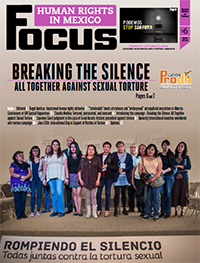 This special edition of Focus is dedicated to one of the gravest human rights violations in our world: torture. We especially dedicate this edition to all survivors of torture.
This special edition of Focus is dedicated to one of the gravest human rights violations in our world: torture. We especially dedicate this edition to all survivors of torture.
Torture is by definition an intentional act committed by those who have power. This crime seeks to control and annul the human personality or erode the physical or mental resistance of the victim, using physical, sexual, and/or psychological pain and suffering to obtain a certain result: a confession, punishment, the criminalization of the victim (even for a crime that has not been committed), or any other goal.
There is a highly developed legal framework that establishes an absolute prohibition on torture. International human rights law prohibits torture with the same force as the prohibition on genocide and slavery. Physical, sexual, and/or psychological torture are forbidden under any circumstances, even during wartime or public emergencies.
This prohibition is so universally accepted that it forms part of international law at the level of ius cogens, the highest category of binding law. The Inter-American Court of Human Rights has repeatedly held that, “There is an international legal system that absolutely forbids all forms of torture, both physical and psychological, and this system is now part of ius cogens. Prohibition of torture is complete and non-derogable, even under the most difficult circumstances…”
However, in Mexico the use of torture is “widespread” according to UN Special Rapporteur on Torture Dr. Juan Méndez, who concluded after visiting the country between April 21st and May 2nd that no security force in Mexico respects the prohibition on torture. The Rapporteur’s message was damning: “I have the duty to inform the Mexican government, but also the Mexican people, that there is an epidemic of torture here that must be corrected.”
This edition of Focus also seeks to explore the differentiated vulnerability and use of torture against women who are detained by security forces in Mexico, particularly the use of sexual torture, which seeks to transform women’s bodies into battlefields, employing physical and psychological techniques that clearly fit within an over-arching context of institutionalized gender violence and discrimination.
Last month, Center Prodh and partner organizations, as well as Amnesty International, launched two respective campaigns against torture: “Breaking the Silence: All Together against Sexual Torture” and “Stop Torture,” both of which call for an end to this brutal practice in general and push for the Mexican government to stop using torture as a primary “investigation” method, often against innocent people.
Torture isn’t justice. Torture is a crime, an attack on human dignity, and a synonym of impunity that must be eradicated.
